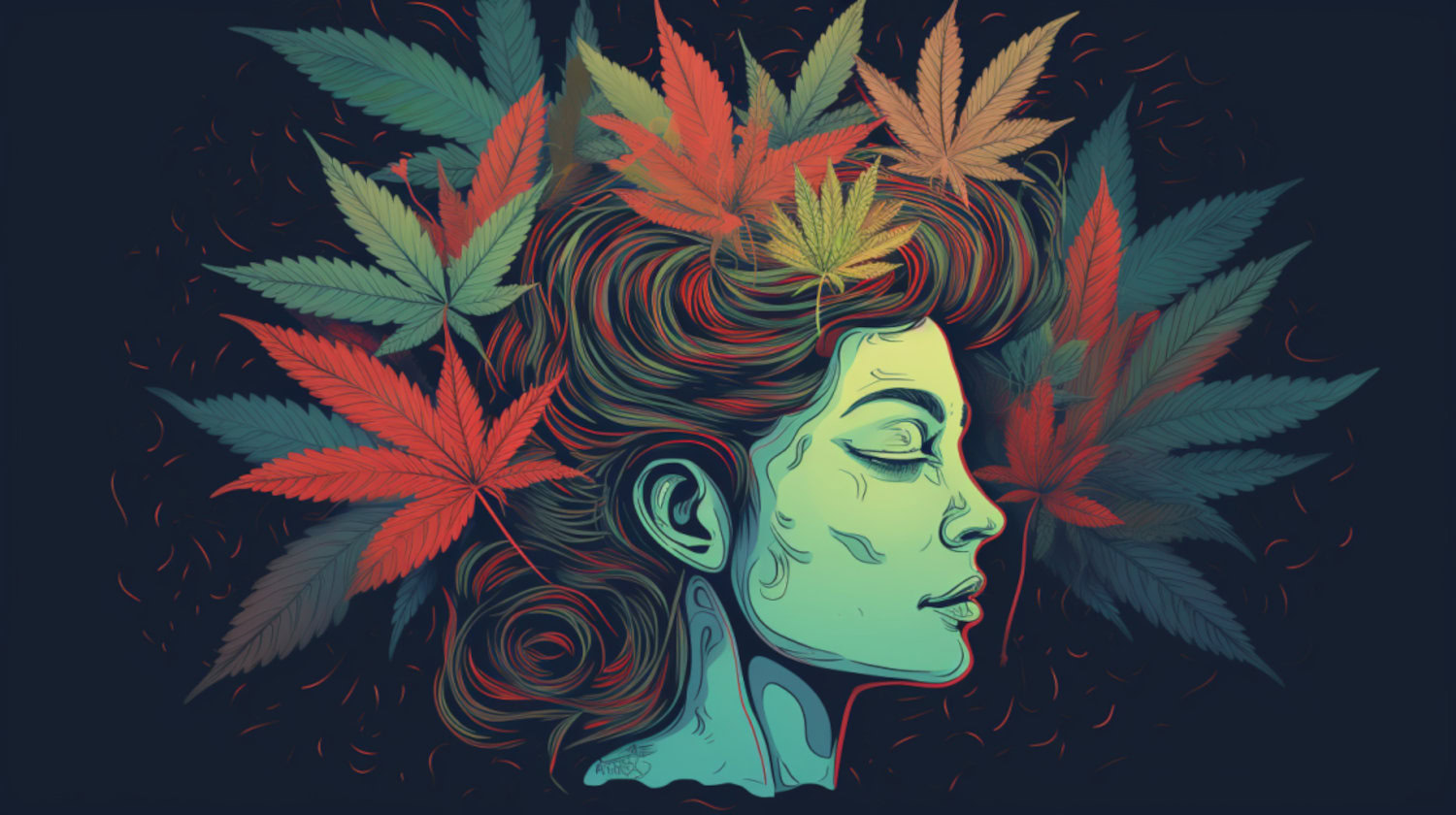Almost every major retailer sells some form of CBD product. In 2022, CBD sales reached $4.17 billion, with predictions of it reaching $4.23 billion by 2026.
But are there risks to such rapid growth? And is CBD withdrawal a real concern?
CBD and the Endocannabinoid System
When consumed, the molecular compounds found in cannabis interact with the body’s endocannabinoid system (ECS), resulting in various intoxicating and therapeutic effects. This system comprises endocannabinoids, enzymes, and cannabinoid receptors that help regulate several bodily functions. Its primary function is to help the body maintain balance.
The most abundant receptors are the CB1 and CB2 receptors. CB1 receptors are found mainly in the central nervous system but also in other organs, such as the liver and skin. They mediate intoxicating effects. CB2 receptors are found within the immune system and other neurons and are mainly involved in anti-inflammatory and immunosuppressive effects.
CBD, short for cannabidiol, is one of the hundreds of phytocannabinoids in the cannabis plant. CBD has been studied for its potential anticonvulsant, sedative, antipsychotic effects, and more.1 However, what can be most intriguing to consumers is CBD’s ability to deliver those effects without inducing the intoxicating feeling known as the “high.” This combo of therapeutic benefits without feeling inebriated has led even the most novice users to use CBD products like many other over-the-counter drugs.
CBD indirectly acts on the CB2 receptors by blocking the breakdown of your body’s natural endocannabinoid, anandamide. Other receptor systems involved in mediating the endocannabinoid system by CBD include the transient receptor potential vanilloid (TRPV) channels and serotonin (5-HT1A) receptors.2
CBD vs. THC: Different Effects on the Body

Not all cannabinoids from the plant affect the receptors of the ECS the same. THC, the most abundant cannabinoid in the plant (in non-hemp variations of cannabis), binds directly to both receptors, while CBD works in indirect ways.
THC consumption can cause many pleasant recreational and medicinal effects, including euphoria and relaxation. It can also induce unpleasant effects, like anxiety or nausea, especially at high doses. Some researchers have found that the 1:1 ratio of THC to CBD allows more THC to be consumed without increasing the adverse side effects.3 However, more recent research conflicts with these studies, stating that CBD does not modulate the effects of THC in any way.4
CBD does not induce any intoxicating effects on the body and can have anticonvulsant, sedative, and antipsychotic effects. It also has little to no impact on motor and cognitive abilities like THC does.
Can You Get Addicted to CBD?
CBD has been demonstrated to be a helpful aid in various health ailments like anxiety, insomnia, chronic pain, and even addiction. In animal studies, CBD was shown to help reduce cravings for substances like nicotine, high-THC cannabis, stimulants, and even heroin.5
With what seems to be an endless list of potential positive therapeutic benefits applicable to a wide range of people, it makes sense to wonder if it’s possible to get addicted to CBD itself.
There is a fine line between a daily habit and an addiction, but dependence is usually when the habit starts to take precedence over other goal-directed behaviors.6 That said, there aren’t any documented cases of CBD addiction. Researchers have found that the non-intoxicating cannabinoid does not exhibit symptoms that would be addicting to an individual.7
From the current research, it appears that the risk of developing a CBD addiction or tolerance has yet to be seen. If you’re curious about starting a CBD regime but hesitate because of concerns of addiction, it may be best to consult with a physician who can better determine if CBD is an effective form of treatment for you.
CBD Withdrawal Symptoms

There aren’t too many studies examining the relationship between CBD, addiction, and withdrawal, but one study found that chronic CBD users were able to tolerate dosages of up to 1,500mg a day.8 A beginner dose is typically recommended to be anywhere from 2.5-5mg. It is unclear if there would be any CBD withdrawal effects if a dosage of 1,500mg a day were to stop.
One study examined the withdrawal symptoms of participants who were administered low dosages of CBD. They found that the cannabinoid did not induce any withdrawal effect after the sudden stoppage of short-term treatment.
Current research reaffirms that there is a low chance of developing any withdrawal symptoms from low-dose CBD treatments.9 If you have concerns about stopping a CBD regime and withdrawal symptoms, it may be best to consult with your physician. They may be able to better guide you on how to wean off your dosage.
How Long Does CBD Withdrawal Last?
There does not seem to be any risk of dependency or withdrawal symptoms for people who consume CBD regularly. The most significant risk may be that the symptoms of ailments may reappear after stopping the use of CBD. This may be especially true if relying on the cannabinoid for chronic pain or sleep issues.
If you want to stop taking CBD and are concerned about symptoms of your ailments coming back, it may be best to speak with a doctor who can recommend a better alternative for your condition.
CBD for Withdrawal: Does it Really Help?

While CBD does not seem to induce any addictive habits or withdrawal symptoms, it has been studied for its ability to help aid in withdrawal from certain substances.
One study done on mice found that CBD reduced the consumption, motivation, and relapse of substances like alcohol, opioids, psychostimulants, and even high-THC cannabis. It also helped with the withdrawal symptoms from morphine and cocaine. This study also found that these results were found with a ratio of THC to CBD rather than CBD on its own.6
While the research is currently limited to studies on animals, studies about CBD and opioid withdrawal have started on humans as well, although the results have yet to be published.
How CBD will affect withdrawal symptoms will be dependent on several other health and lifestyle factors. The limited studies regarding the addictiveness of CBD and its effects on withdrawal are still promising. If you are interested in using CBD to help with withdrawal from other substances, it may be best to consult with your physician first.
References
- Martin-Santos R, Crippa JA, Batalla A, et al. Acute effects of a single, oral dose of d9-tetrahydrocannabinol (THC) and cannabidiol (CBD) administration in healthy volunteers. Current pharmaceutical design. 2012;18(32):4966-4979. doi:https://doi.org/10.2174/138161212802884780 ↩︎
- Britch SC, Babalonis S, Walsh SL. Cannabidiol: pharmacology and therapeutic targets. Psychopharmacology. 2020;238(1):9-28. doi:https://doi.org/10.1007/s00213-020-05712-8 ↩︎
- Boggs DL, Nguyen JD, Morgenson D, Taffe MA, Ranganathan M. Clinical and Preclinical Evidence for Functional Interactions of Cannabidiol and Δ9-Tetrahydrocannabinol. Neuropsychopharmacology. 2017;43(1):142-154. doi:https://doi.org/10.1038/npp.2017.209 ↩︎
- Englund A, Oliver D, Chesney E, et al. Does cannabidiol make cannabis safer? A randomised, double-blind, cross-over trial of cannabis with four different CBD:THC ratios. Neuropsychopharmacology. 2022;48(6):869-876. doi:https://doi.org/10.1038/s41386-022-01478-z ↩︎
- Navarrete F, García-Gutiérrez MS, Gasparyan A, Austrich-Olivares A, Manzanares J. Role of Cannabidiol in the Therapeutic Intervention for Substance Use Disorders. Frontiers in Pharmacology. 2021;12. doi:https://doi.org/10.3389/fphar.2021.626010 ↩︎
- Vandaele Y, Ahmed SH. Habit, choice, and Addiction. Neuropsychopharmacology. 2021;46(4):689-698. doi:https://doi.org/10.1038/s41386-020-00899-y ↩︎
- Viudez-Martínez A, García-Gutiérrez MS, Medrano-Relinque J, Navarrón CM, Navarrete F, Manzanares J. Cannabidiol does not display drug abuse potential in mice behavior. Acta Pharmacol Sin. 2019;40(3):358-364. doi:10.1038/s41401-018-0032-8 ↩︎
- Iffland K, Grotenhermen F. An Update on Safety and Side Effects of Cannabidiol: A Review of Clinical Data and Relevant Animal Studies. Cannabis and Cannabinoid Research. 2017;2(1):139-154. doi:https://doi.org/10.1089/can.2016.0034 ↩︎
- Taylor L, Crockett J, Tayo B, Checketts D, Sommerville K. Abrupt withdrawal of cannabidiol (CBD): A randomized trial. Epilepsy Behav. 2020;104(Pt A):106938. doi:10.1016/j.yebeh.2020.106938 ↩︎
The information in this article and any included images or charts are for educational purposes only. This information is neither a substitute for, nor does it replace, professional legal advice or medical advice, diagnosis, or treatment. If you have any concerns or questions about laws, regulations, or your health, you should always consult with an attorney, physician or other licensed professional.



